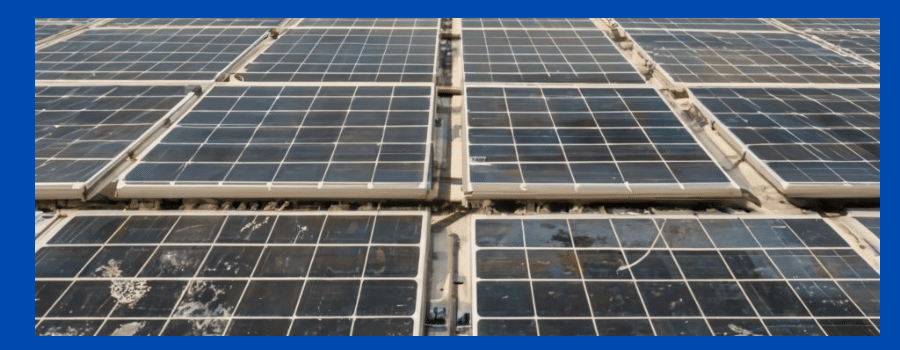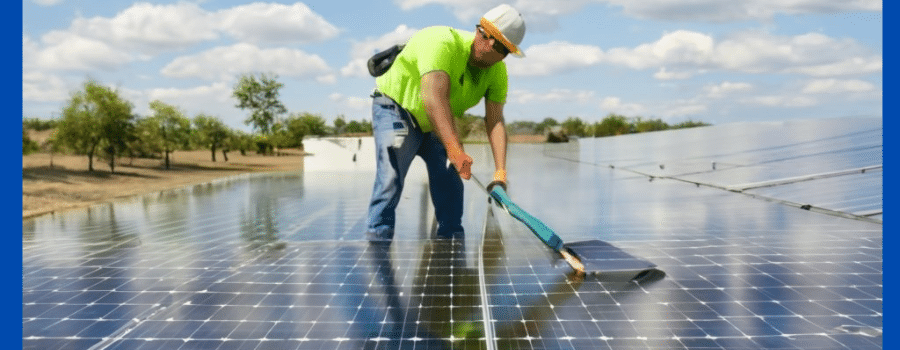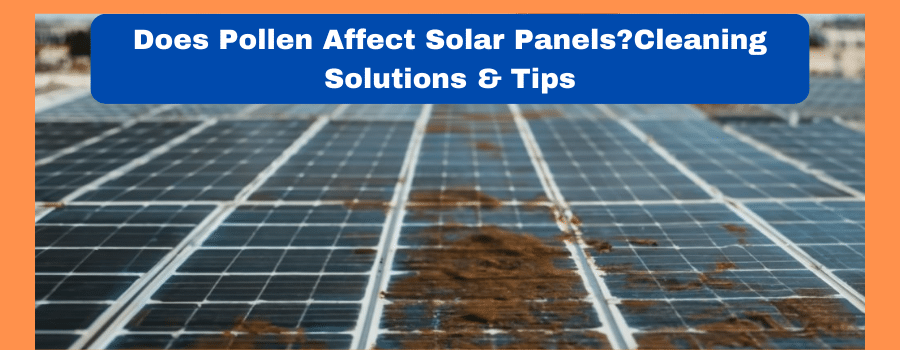In the modern era of technology, Solar panels are an efficient source of electricity generation. Solar panels convert sunlight energy into electric current when exposed to sunlight. But Do you know, the presence of dust and pollens can reduce the efficiency of solar panel’s energy production?
Yes, Pollen can affect solar panels in many ways and they need to be clean to maintain their productivity. Since pollen covers the surface of solar panels surface, hence the efficiency of energy production is reduced by up to 15-20%.
In this post, we will navigate the reasons and circumstances under which pollen can influence solar panels. Moreover, we will provide a complete guide to minimize the effects of pollen on the efficiency of solar panels.
Does pollen affect Solar Panels?
As the spring season arrives, flowers are blooming and they start releasing micro-particles known as pollens. Pollen seems to be harmless but when a layer of pollen particles gets deposited on the surface of solar panels, these tiny particles can reduce the performance of generating electricity by about 15-20% in the peak pollen season.
How does pollen affect solar Panels?
The surface of solar panels is coated with photovoltaic cells but when they get dirty with pollens, dust, bird droppings, and vegetation, their potential to absorb sunlight will be affected. Pollen, along with other environmental debris, such as dust and bird droppings, can accumulate and create a film on the panel surface. Hence this layer of pollen can block sunlight and diminish the efficiency of the solar panels.
Furthermore, pollen can also damage the panels’ surface as well as reduce their life span. So, a clean and maintained solar system not only produces maximum power output but also enhances the life of panels to about 5 years more.
Therefore, panels can not manage to produce full potential energy. In this case, we need to clean and maintain our solar panels frequently.

Impacts of pollen on solar panel’s efficiency
The presence of pollen on the panel’s surface impacts its efficiency in many ways which are as follows;
- Lower energy output
Pollens act as an obstacle between sunlight energy and photovoltaic cells of solar panels. The accumulation of pollen on solar panels reduces the absorption of sunlight, resulting in a decrease in electricity output.
- Effectiveness
Pollens affect the overall efficiency of solar panels by lowering energy production which would be a challenge and a major concern for solar system operators and owners.
- Damage Coating
If pollen particles remain accumulated for longer periods on the surface of solar panels, they could harm the panels’ protective coating. Along with the panel’s maintenance, we also need to look at the mounting system. Since they are made from metals and mounted in an open environment, they tend to get rusted. Hence protecting the solar panel system from rust is also mandatory action.
- Maintenance cost
To optimize the performance and efficiency of solar panels, they need to be cleaned regularly from pollen and dust, which demands more effort and maintenance costs.
- Impact of specific location
Pollen effects on solar panels depend on the geographic location of their installation, type of vegetation, and specific seasons. The results are more apparent in regions with high pollen grains and vegetation density like California during the summer and spring seasons.
Do Solar panels need cleaning?
Everything lying outside in the open air gets dirty by the accumulation of dust, leaves, and bird droppings. Likewise, the solar panel’s surface is covered with dust and deposited with layers of pollen if remains unnoticed for a long time. Therefore, panels need to be washed and cleaned frequently to maintain their performance.
How to clean Solar Panels: Best Solutions and Strategies
You can clean the Solar panels yourself but hiring a professional is the best choice. Follow the below-mentioned tips and strategies to ensure the safety of your solar system.
- Follow the manufacturer’s directives
Ensure you carefully review the manufacturer’s guidelines before cleaning your solar panels. Knowing the correct cleaning method is essential to avoid any damage. Inadequate cleaning may result in efficiency issues or could potentially void your warranty.
- Self-Cleaning
Many solar panel systems are designed to be self-cleaning. The combination of rainwater, high-quality glass coating, and the typical rooftop angle works together to effectively wash away dust and pollen from the surface of solar panels.
- System Shut down
It is highly advisable to shut down the solar system panels before cleaning them for safety.
- Gentle cleaning
Carefully remove the deposits of pollen with the use of spongy clothes and soft brushes to prevent any scratches to the panels’ coating.
- Avoid cold water
Do not splash the hot surface of solar panels with cold water to prevent cracks and rapid contraction.
- Use of mild chemicals
Clean or warm water and mild detergents are suggested to clean the panels’ surface. The use of acids and heavy chemicals may react with the glass surface and damage it, resulting in the loss of energy production.
In which conditions, do panels need more cleaning efforts?
There are some specific locations and conditions in which your panels need to be cleaned for optimal performance.
- If your solar panels are installed in pollen-rich areas, they will be more accumulated with pollen and debris. In this case, you should wash and clean your panels frequently.
- If you live in areas that are highly polluted with smog or air pollution, your panels are likely to have more dust and dirt particles on them, reducing their working efficiency. So, it is necessary to clean them regularly.
- In areas, where the construction of buildings and roads is taking place, your panels get more dust and soil on their surface, so you need to put more effort into maintaining and keeping them clean.
- In sandy or desert regions, the solar panels are highly accumulated with sand, getting more dirt and dust; need to be washed frequently for their optimized performance and ability to generate electricity.

Preventive Measures for Pollen deposition on solar panels
Preventive measures and precautions should be taken to minimize the effects of pollen deposition on the efficiency of solar panels.
- Regular inspection
If solar panels are regularly monitored then you would be able to detect and remove the pollen accumulation before it leaves any impact on the efficiency of solar systems’ performance.
- Use Special Coatings
Hydrophobic coatings on the surface of solar panels, serve as a water-repellent layer for pollens not to deposit on them. As a result, the panels will remain clear for extended periods.
- Frequent Cleaning
Solar panels need to be cleaned frequently specifically in the areas that are highly affected by pollens. You can do it yourself with the use of water along with some mild chemicals and soft brushes.
- Surface covering
Solar panels sheltered with some protective covers act as a barrier for pollen deposition during the spring and summer seasons. This strategy will lessen the need for regular cleaning and maintenance of panels.
- Trimming foliage
Cutting and reducing the number of plants and trees near the solar system can help diminish the possibility that pollen falls and accumulates on their surface. As a result, the efficiency of the panel’s ability to generate electricity will be less affected.
Conclusion
We came to know that solar panels are an efficient source of electricity production by exploiting the power of the sun but their efficiency is highly affected by the presence of pollens on their surface. The pollens hamper the sunlight from getting absorbed by the panels’ resulting in lower energy production.
This effect can be minimized by adopting some best practices to clean the solar panels regularly. You are also recommended to take some safety measures to prevent any damage while cleaning the panels. In this way, you will be able to maintain the performance and life span of solar panels for up to 25 years.




